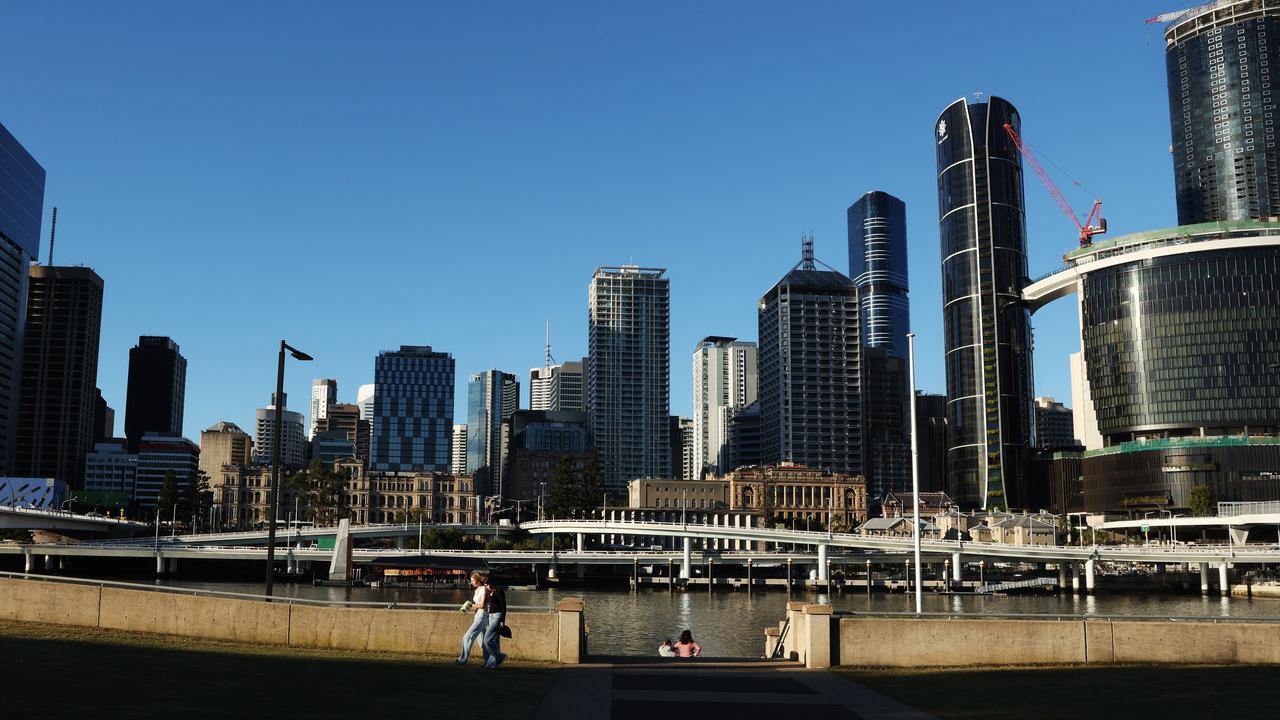Macquarie earnings plunge miss market expectations amid deals drought, announces $2bn buyback
Higher for longer interest rates will not hurt Macquarie’s ability to grow and produce sustainable profits but rate volatility is making investors cautious.

Business
Don't miss out on the headlines from Business. Followed categories will be added to My News.
Higher for longer interest rates will not hurt Macquarie’s ability to grow and produce sustainable profits, chief executive Shemara Wikramanayake says, but volatility is making investors cautious.
Speaking after reporting Macquarie’s weakest interim profit since 2021 and a big miss to market expectations, Ms Wikramanayake said the financial conglomerate, and investors alike would have to adapt.
“When I started my career interest rates were 15 per cent, so having them at four or five doesn’t feel like a world where we can’t all function in,” she said.
“We’re just going to have to adapt and evolve and live in what will be probably rates at around those levels for the foreseeable future.”
She said the recent spike of rates beyond central bank moves had made people more cautious, and therefore a previously expected recovery in M&A activity levels was not taking place, leading its investing banking unit to downgrade market expectations slightly.
“It’s made people cautious. So activity levels have been subdued and that meant in Macquarie Capital we’ve seen less activity in terms of corporates and what they‘re doing,” she said.
At its $$892bn global asset management business, Macquarie is seeing more dry powder build up on the sidelines with “less assets coming to the market” she added, while more people are keen to invest in private credit.
She said that with “higher rates and also higher inflation we think things like the asset management business should do well because we focus a lot on real assets where there is much better inflation resilience than other asset classes. And we’ve seen good flows to that asset class.”
The company on Friday reported a net profit of $1.4bn in the six months ended September 30, a 39 per cent plunge and a big miss to market expectations.
A $2bn buyback announced on the day was a silver lining for investors and analysts in a result that showed lower performance fees in its global asset management business amid a stubbornly slow deal-making environment and higher costs had hurt profitability.
Shares fell as much as 3 per cent to a 12-month low in initial trading following the result, which also included a 15 per cent fall in dividends declared to $2.55 per share.

Shares recovered to be as much as 1.9 per cent higher at $162.54 each in the afternoon.
“Macquarie is a complicated piece but they are still a growth story that is not constrained by Australian GDP growth,” said Hugh Dive, Atlas Funds Management chief investment officer.
“They are growing offshore and are benefiting from a lower Aussie dollar. The story is intact, but there is no wild event that is leading them to make a lot of money this year.”
Macquarie management spent two hours in a call explaining to investors that the result (including the halving of its annualised return on equity to 8.7 per cent) follows exceptional circumstances that led to a record $5.2bn full year profit last year, and was mainly impacted by the timing of asset sale realisations.
“The first-half result was substantially down compared to a strong period of realisations in the prior corresponding period, with an expectation that green energy realisations will be predominantly in the second half,” Ms Wikramanayake said.
“Our annuity-style businesses saw growth in loan books, deposits and assets under management,” she added, referring to its local Banking and Financial Services unit and its Macquarie Asset Management (MAM) business.
Following bumper asset sales from its Green Investment Group last year, as well as gains in its commodities business on the back of the Ukrainian war and wild weather in North America, the result shows deals are still taking longer to come by.
Three out of Macquarie’s four divisions posted double-digit falls in profit during the first half, with its local commercial banking unit BFS the exception with a 10 per cent jump in profit to $638m.
The largest contribution to profit (40 per cent) came from its commodities and global markets business, which posted a net contribution (after profit distributions to non-controlling interests) of $1.38bn, down 31 per cent and also below market expectations.
The asset management division was the biggest driver of the earnings decline, with profits down by more than two thirds (71 per cent) to $407m due to rising costs and a drought of green asset sales, which puts a halt on lucrative performance fees.
Compared to the previous half ending March 31, Macquarie’s interim profit was down a whopping 51 per cent.
Macquarie’s earnings are expected to jump by about a third in the second half to about $2.38bn, driven by an expected recovery in deal making activity and the usual skew of earnings to the second half.
But even if that happens, it will not be enough to avoid a fall in full-year earnings by about a fifth to $4.1bn after a record $5.2bn profit last year, when its commodities unit alone increased by over half to $6bn.
The bank tempered expectations for its Macquarie Capital unit. It said a previous expectation for transaction activities to be higher in the second half – and therefore lead to higher advisory fees – had now changed to remain at similar levels than in the first half.
“The pipeline of activity is good but there is still a gap from a buyer and seller perspective and the interest rate movements have an impact on the completion of transactions, so we thought it was appropriate to reflect that (on the outlook),” chief financial officer Alex Harvey said.
Macquarie said it was already clear full year operating income at Macquarie Asset Management would “substantially down” on last year, and said net operating income in the second half will be “broadly in line with 2H23.”
The millionaires’ factory – as the financial conglomerate is known for the high salaries of its bankers – said it had $10.5bn of surplus capital, down slightly from the $10.8bn at the end of June.
Separate from that, Macquarie’s MAM unit had a record $35bn in dry powder to invest over the next four years.
Citigroup analysts said the result was “a very soft headline result which is arguably also of a lower quality than market expectations given the credit impairment reversal.” The bank booked $117m in credit reversals as profit, compared with a $286m charge in the first half last year.
Costs were also higher than expected at $5.9m – up 6 per cent from a year earlier. This was mainly driven by higher salaries for its expanded 21,000-strong staff base, as well as due to higher investment in technology initiatives.
UBS analysts said the buyback had been the “only silver lining” in the result, while Barrenjoey analyst Jonathan Mott said the result would likely lead to a 5-to-10 per cent downgrade to consensus estimates, mainly due to higher cost expectations. “But 2H24 revenue expectations depend on green energy realisations and commodities income,” he told clients in a note.
The group said it will appoint Wayne Byres, the former chair of the Australian Prudential Regulation Authority, as a non-executive director of Macquarie Bank’s board. The appointment will be effective February 1, 2024, and follows the expected retirement of Michael Coleman in mid-2024.
More Coverage
Originally published as Macquarie earnings plunge miss market expectations amid deals drought, announces $2bn buyback





